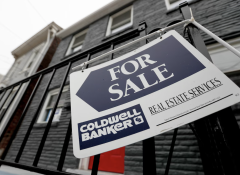July 12, 2024
The shortage of affordable housing is hurting people with disabilities most of all | Opinion

By Dyann Roth
This article ran on PennLive on July 10th, 2024.
The nation’s affordable housing crisis has reached a boiling point. The impact of this crisis on millions of Pennsylvanians who are living with disabilities or experiencing mobility challenges and functional disabilities as they age is massive.
Their struggle is finding housing that is both affordable and accessible. They want the opportunity to live as independently as possible, for as long as possible, in a place they call “home”—a place that is safe and accessible, and that supports their independence so that they can live their lives on their terms. Isn’t this what we want for ourselves and those we love?
For more than 50 years, Inglis has been helping people with disabilities live independently in communities of their choice. I’m proud to say we continue to evolve our housing models, programs, services, and resources to meet the changing needs and preferences of older adults and individuals with disabilities—and to leverage new technologies that make independence more achievable.
However, like the broader housing crisis across the state and the nation, the lack of affordable, accessible housing options has escalated to levels we’ve never experienced before.
There are a few reasons for this. First, thanks to advances in medicine, we’re all living longer, including people with complex disabilities. Pennsylvania’s senior population growth rate is 20 times higher than that of the general population. This means we have an expanding population of people needing modified or accessible housing.
Second, 79% of Pennsylvania’s housing units were built before the Americans with Disabilities Act (ADA), which means they were not built with accessibility in mind.
Lastly, studies show that 40% of renters and 23% of homeowners with disabilities do not have enough money for basic needs like food and housing. While the demand is increasing, an adequate supply of affordable, accessible housing is simply not available.
So, what can we do? Inglis recently hosted “Opening Doors Together, Accessible Housing: A Human Right.” This two-day statewide conference in Harrisburg brought together stakeholders dedicated to closing the gap in accessible housing. Our gathering sought to amplify the progress that can be made through collaboration across sectors, informed by the voices of the people we support.
In our view, there are three strategies for closing this housing gap.
The first may be obvious: building accessible, affordable new housing. However, it also presents challenges—financing and time, to name two. As a housing developer, I can tell you that we cannot build our way out of this crisis—certainly not anytime soon and not without considerable investment of resources.
The second strategy is working with fellow developers in both the affordable and market-rate housing industries to carve out a percentage of accessible, affordable units in new housing development projects.
We recently collaborated with New Courtland—one of Philadelphia’s leading housing developers—to ensure that a portion of their newest apartments would be both accessible and affordable. In a project like this, we not only offer design expertise but also provide services to support residents with disabilities. The goal is to create a diverse and inclusive community where everyone can live the life they choose.
Strategy three is expanding the availability of home-modification services.
At the most basic level, these modifications include installing ramps, grab bars, accessible showers, and nonslip flooring; making faucets, doorknobs, and appliances easily reachable at wheelchair height; and identifying any other adaptive equipment that an individual or family may need in their home. In addition, Inglis is leveraging our assistive-technology expertise to integrate more accessibility features, like smart-home technology. Home modifications are the fastest and often the most affordable way to help people remain in their home.
While Inglis is making significant progress in expanding the availability of home modifications and assistive-technology services—having completed 300 modification projects across the Commonwealth in the past 12 years—we currently have more than 450 people in 51 counties on our waiting list for these services.
We have an opportunity to help solve Pennsylvania’s affordable, accessible housing crisis with cost-effective home modifications and assistive technology. Let’s amplify our investment in this strategy to ensure we all have a place to call home—one that supports our independence and ability to live our best lives.
Dyann Roth is the president and CEO of Inglis, a statewide organization dedicated to supporting the independence of people with disabilities and older adults.
